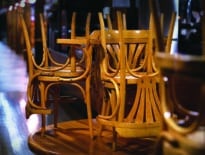
Gov. Charlie Baker has sparred with Boston Mayor Marty Walsh over local bans on construction work during the coronavirus pandemic. State House News Service photo / File
Gov. Charlie Baker has been reluctant to completely shut down all new construction across Massachusetts, struggling to find a way to keep badly needed housing and infrastructure projects going.
You can’t blame the guy. As the economic pain mounts and hard-fought gains in new home construction and repairs to public transit teeter on the edge, Baker is scrambling to strike a balance.
But the governor’s insistence on keeping some fairly sizable construction projects going amid the lockdown has come under increasing fire from the Bay State’s construction unions.
The Massachusetts Building Trades Council, which represents 75,000 union construction workers across the state, recently urged Baker to shut down all but truly emergency projects.
The carpenters’ and painters’ unions put some muscle behind those words last week, with thousands refusing to show up for work on various projects across the state.
Baker has stuck by his guns, with state officials issuing beefed up social distancing and cleaning protocols they argue will allow construction workers to hammer away safely
However, this is a mistake, and potentially a very big one at that.
Unions Are No NIMBYs
The call for a nearly complete construction shutdown in Massachusetts is not the work of some NIMBY group opposed to new development.
Rather, it comes from some of the staunchest supporters of new construction around, and who also have the most to lose if projects go belly–up, leaving holes in the ground where thriving worksites were.
Labor organizers are seeing evidence of unsafe practices first-hand at non-union construction sites, including vans jammed with workers pulling up in the morning to drop off their crews. No social distancing there.
The historic building boom we have seen in the Boston area, and especially in the region’s urban core in Boston, Cambridge and Somerville, may not have been possible without not only the labor of union construction workers, but their political support as well.
Opposition to new development was fierce in neighborhoods across Boston in the 1990s and 2000s. This was especially the case in South Boston, whose enmity towards building projects could have prevented the Seaport’s transformation over the past three decades from wind-swept parking lots and docks to a new residential and commercial hub.
But members of the city’s construction trade unions helped shift the balance, providing a regular and badly needed army of foot soldiers at public hearings that had been dominated by NIMBY types for whom every proposed tower was an outrage.
It didn’t always work. Frank McCourt, the one-time Seaport parking lot king, crashed and burned in his bid to build a ballpark for the Red Sox on his harborside land, despite vocal support among Southie ironworkers and other tradesmen and women.
But more often than not it succeeded, helping unleash the biggest wave of construction the city has ever seen.
It Matters Who Backs a Freeze
The strong support for the states’ construction unions for new projects is based on two very simple ideas.
First off, their members like to work, and work they do at some of the most dangerous and physically demanding jobs out there.
And two, if new development gets sidelined by local politics, then there is no work and no paycheck.
So, it’s highly significant the state’s construction unions are the ones calling for the shutdown in work.
It’s also significant that the political leader heading the charge, Boston Mayor Marty Walsh, is a former top construction union official himself.
Walsh has made his campaign to get tens of thousands of new apartments, townhomes and condos built in Boston a centerpiece of his tenure.

Construction workers say they face dangerous conditions in and around job sites that could easily lead to transmission of the coronavirus.
And last month, Walsh was the first big–city mayor in the country to order a construction shutdown and he has since extended it indefinitely.
Cambridge and Somerville have taken similar actions.
“Is there anyone who cares more about housing in the state than Marty Walsh? And you saw what he did,” said Bert Durand, a spokesman for North Atlantic States Regional Council of Carpenters in Boston.
A Fight for Workers’ Safety
Yet, work has continued on state projects and developments on state-owned land in Boston, like the extensive Seaport tracts owned by Massport.
And even more construction work is plunging ahead on housing and other projects in the suburbs beyond Boston, Cambridge and Somerville, a good bit of it being done by non-union labor.
While there are certainly lots of responsible, open-shop contractors, there is an argument to be made that not just pay, but also safety standards, can also be lower on non-union jobs.
Labor organizers are seeing evidence of unsafe practices first-hand at non-union construction sites, including vans jammed with workers pulling up in the morning to drop off their crews, noted Durand, the carpenters’ union spokesman.

Scott Van Voorhis
No social distancing there.
“We have had members who have been asking for this and who do not feel they are safe on job sites and don’t understand why construction workers are being sent to work while everyone else is staying home,” Durand said.
Some of the fiercest supports of new development are issuing a bonified, canary-in-the-coal-mine warning, straight from the front lines.
It’s time for the governor to reexamine his stance.
Scott Van Voorhis is Banker & Tradesman’s columnist; opinions expressed are his own. He may be reached at sbvanvoorhis@hotmail.com.




 |
| 

